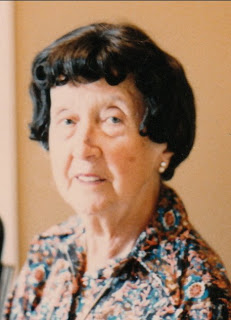Tips for Families Visiting Dementia Residents

My Grandma Lily lived for several years in a nursing home, and toward the end of her life she became quite confused. While this was disturbing to me and the rest of the family, I found when I changed my approach and expectations of our time together, our visits were more successful. Between that experience, my training as a psychologist, and my work in nursing homes, I’d like to offer some suggestions of what might be helpful to others in their visits with residents with dementia. If you have additional tips that have worked for you, please add them to the comments section.
Post family photographs, with labels that indicate the names and relationships of those pictured. It will serve as a reminder for your family member, and enable the nursing home staff to reinforce connections. I filled an inexpensive multi-photo frame with pictures, wrote the names on the mat between the photos, and hung it in a spot my grandmother could see from her bed.
Put a calendar on the wall and log your visits to help your loved one remember when you were last there, and when you’re planning to return.
Create a sign in book for guests, so your relative can review it after you’ve left. Add details (“Shared a pizza.” “Talked about the time we went to the circus.”) to refresh memories and to allow other callers to pick up the thread of conversations.
Leave other visible reminders of your visit — flowers, balloons, cards, photos, etc.
Turn off the TV, close the door, and minimize background noises during your time together.
Sit in chairs and on the bed so that you’re at the eye level of your seated relative. One family I know brought in small folding chairs, labeled them, and tucked them in a corner when not in use.
Use visual cues such as photo albums and small keepsakes during conversations.
Sing songs, listen to music, and dance, if possible. I used to exercise with one lady in the nursing home, running an individualized stretch class with her following along. She was very good at it, and I believe it helped her stay on her feet longer than she might have otherwise.
Go outside and share the sunshine, the breeze, and the respite from bells and buzzers.
Ask questions you know your loved one can answer, and don’t ask those your relative cannot. The goal is to provide a “success experience.” Not being able to respond correctly to a question once easily answered can be frustrating and/or embarrassing for someone with dementia, and upsetting for those visiting.
Redirect, rather than contradict, if your relative insists that something is true when you know it’s not. For example, I once woke Grandma Lily up from a nap and she said, “Eleanor, what are you doing here in the middle of the night?”
“But Grandma, it’s the middle of the afternoon,” I told her as I opened her window curtains. “See, it’s still light outside.”
“Oh, it’s always like that this time of year!” she told me.
Seeing I wouldn’t win that argument, I shifted the discussion to another topic, and I’ve savored the humor of that moment for years.
Let go of expectations. While Grandma Lily wasn’t the same person she used to be, she still had a lot of the same general characteristics (for instance, all visits had to include food), and she was glad to see me, even if she didn’t always know who I was.
